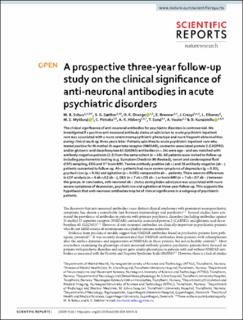A prospective three-year follow-up study on the clinical significance of anti-neuronal antibodies in acute psychiatric disorders
Schou, Morten Brix; Sæther, Sverre Georg; Drange, Ole Kristian; Brenner, Eiliv; Crespi, Joan Vidal; Eikenes, Live; Mykland, Martin Syvertsen; Pintzka, Carl Wolfgang Schøyen; Håberg, Asta; Sand, Trond; Vaaler, Arne; Kondziella, Daniel
Peer reviewed, Journal article
Published version

Åpne
Permanent lenke
https://hdl.handle.net/11250/2829998Utgivelsesdato
2019Metadata
Vis full innførselSamlinger
Originalversjon
10.1038/s41598-019-56934-6Sammendrag
The clinical significance of anti-neuronal antibodies for psychiatric disorders is controversial. We investigated if a positive anti-neuronal antibody status at admission to acute psychiatric inpatient care was associated with a more severe neuropsychiatric phenotype and more frequent abnormalities during clinical work-up three years later. Patients admitted to acute psychiatric inpatient care who tested positive for N-methyl-D-aspartate receptor (NMDAR), contactin-associated protein 2 (CASPR2) and/or glutamic acid decarboxylase 65 (GAD65) antibodies (n = 24) were age – and sex matched with antibody-negative patients (1:2) from the same cohort (n = 48). All patients were invited to follow-up including psychometric testing (e.g. Symptom Checklist-90-Revised), serum and cerebrospinal fluid (CSF) sampling, EEG and 3 T brain MRI. Twelve antibody-positive (ab+) and 26 antibody-negative (ab−) patients consented to follow-up. Ab+ patients had more severe symptoms of depression (p = 0.03), psychoticism (p = 0.04) and agitation (p = 0.001) compared to ab− patients. There were no differences in CSF analysis (n = 6 ab+/12 ab−), EEG (n = 7 ab+/19 ab−) or brain MRI (n = 7 ab+/17 ab−) between the groups. In conclusion, anti-neuronal ab+ status during index admission was associated with more severe symptoms of depression, psychoticism and agitation at three-year follow-up. This supports the hypothesis that anti-neuronal antibodies may be of clinical significance in a subgroup of psychiatric patients.
